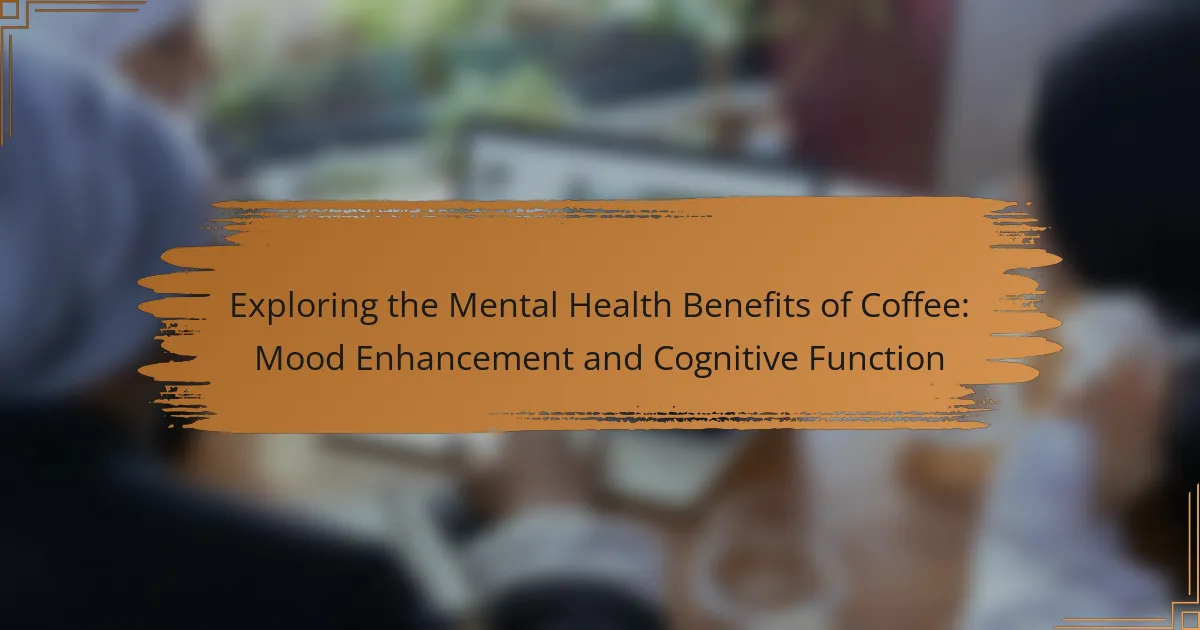
What are the mental health benefits of coffee?
Coffee can enhance mental health by improving mood and cognitive function. The caffeine in coffee stimulates the central nervous system. This stimulation can lead to increased alertness and reduced fatigue. Research indicates that caffeine can elevate mood and reduce the risk of depression. A study published in the “American Journal of Psychiatry” found that individuals who consume coffee regularly have a lower risk of depression. Additionally, coffee intake is associated with improved cognitive performance. Caffeine has been shown to enhance memory, attention, and reaction times. Overall, coffee consumption may contribute positively to mental well-being.
How does coffee influence mood enhancement?
Coffee influences mood enhancement primarily through its caffeine content. Caffeine acts as a stimulant that increases the release of neurotransmitters like dopamine and serotonin. These neurotransmitters play a crucial role in regulating mood and emotions. Research indicates that moderate coffee consumption can lead to improved mood and decreased feelings of depression. A study published in the Journal of Psychopharmacology found that individuals who consume coffee regularly report lower rates of depression. This effect is attributed to caffeine’s ability to enhance alertness and reduce fatigue, contributing to a more positive mood.
What compounds in coffee contribute to mood improvement?
Caffeine and antioxidants in coffee contribute to mood improvement. Caffeine acts as a central nervous system stimulant. It enhances alertness and can reduce feelings of fatigue. This stimulation can lead to improved mood and cognitive function. Antioxidants, such as chlorogenic acids, may also play a role. They help reduce oxidative stress, which is linked to mood disorders. Studies have shown that regular coffee consumption is associated with a lower risk of depression. A study published in the Journal of Affective Disorders found that caffeine intake is positively correlated with mood elevation.
How does caffeine affect neurotransmitter levels related to mood?
Caffeine increases neurotransmitter levels related to mood, particularly serotonin and dopamine. It acts as an adenosine receptor antagonist, reducing adenosine’s inhibitory effects. This leads to increased release of neurotransmitters that promote alertness and improve mood. Studies show that caffeine consumption can elevate mood and reduce feelings of depression. Research indicates that moderate caffeine intake is associated with a lower risk of depression. For example, a study published in JAMA Internal Medicine found that individuals consuming coffee had a reduced risk of depression over time. Thus, caffeine positively influences neurotransmitter levels, contributing to enhanced mood.
What role does coffee play in cognitive function?
Coffee enhances cognitive function primarily through its caffeine content. Caffeine stimulates the central nervous system. This stimulation can lead to improved alertness and concentration. Studies indicate that caffeine may enhance memory performance. Research published in “Psychopharmacology” by Haskell et al. (2005) shows caffeine improves attention and reaction times. Additionally, coffee consumption is linked to a lower risk of cognitive decline in older adults. The “American Journal of Epidemiology” reported that regular coffee drinkers have a reduced risk of Alzheimer’s disease. Thus, coffee plays a significant role in supporting cognitive health.
How does coffee consumption impact memory and focus?
Coffee consumption enhances memory and focus. Caffeine, the primary active ingredient in coffee, is a stimulant. It increases alertness and concentration by blocking adenosine receptors in the brain. This leads to improved cognitive performance. Studies show that moderate coffee intake can boost short-term memory. Research published in the journal “Psychopharmacology” found that caffeine enhances memory consolidation. Additionally, caffeine may improve focus during tasks requiring sustained attention. Overall, coffee consumption positively impacts cognitive function and mental clarity.
What are the potential effects of coffee on reaction time?
Coffee can enhance reaction time. The caffeine in coffee stimulates the central nervous system. This stimulation leads to increased alertness and improved cognitive function. Research shows that caffeine can reduce reaction times in tasks requiring quick responses. A study published in the journal “Psychopharmacology” found that caffeine improved reaction times by an average of 10%. Additionally, caffeine enhances focus, which contributes to faster responses. Overall, coffee positively affects reaction time through its caffeine content.

How does coffee consumption affect mental well-being?
Coffee consumption positively affects mental well-being. It enhances mood and cognitive function. Caffeine, a primary component of coffee, stimulates the central nervous system. This stimulation can lead to increased alertness and improved focus. Studies indicate that moderate coffee intake may reduce the risk of depression. Research published in the Journal of Affective Disorders found that higher coffee consumption is linked to lower depression rates. Additionally, coffee may help improve memory and reaction times. These benefits contribute to overall mental health and well-being.
What are the psychological effects of regular coffee intake?
Regular coffee intake can enhance mood and cognitive function. Caffeine, the primary active ingredient in coffee, stimulates the central nervous system. This stimulation can lead to increased alertness and improved concentration. Studies indicate that caffeine can elevate mood and reduce the risk of depression. Research published in the Journal of Psychopharmacology found that caffeine consumption is associated with a lower incidence of depressive symptoms. Additionally, regular coffee drinkers may experience improved memory and reaction times. The positive effects on mental performance are often attributed to caffeine’s role in blocking adenosine receptors in the brain. This mechanism can lead to heightened energy levels and better overall mental clarity.
How can coffee consumption reduce symptoms of depression?
Coffee consumption can reduce symptoms of depression due to its caffeine content. Caffeine acts as a stimulant, increasing the release of neurotransmitters like serotonin and dopamine. These neurotransmitters play a crucial role in mood regulation. Research indicates that individuals who consume coffee regularly have a lower risk of developing depression. A study published in the Archives of Internal Medicine found that those who drank four or more cups of coffee daily had a 20% lower risk of depression. This suggests a potential protective effect of coffee against depressive symptoms.
What is the relationship between coffee and anxiety levels?
Coffee consumption can increase anxiety levels in some individuals. Caffeine, the primary stimulant in coffee, can lead to heightened heart rates and restlessness. Studies show that high doses of caffeine may trigger or exacerbate anxiety symptoms. Research published in the Journal of Psychopharmacology found that caffeine can induce anxiety in sensitive individuals. Additionally, a study by the American Journal of Psychiatry indicated that excessive caffeine intake correlates with increased anxiety disorders. Therefore, while coffee may enhance mood for some, it can also negatively impact anxiety levels for others.
What factors influence the mental health benefits of coffee?
The mental health benefits of coffee are influenced by several factors. Caffeine content plays a significant role in enhancing mood and cognitive function. Research shows that moderate caffeine intake can reduce the risk of depression. Individual tolerance to caffeine varies, impacting its psychological effects. Genetic factors also determine how caffeine is metabolized, affecting its benefits. The timing of coffee consumption can influence its effectiveness on mood. Additionally, the presence of antioxidants in coffee contributes to its overall health benefits. Studies indicate that regular coffee drinkers may experience a lower incidence of mental health disorders.
How do individual differences affect coffee’s impact on mood?
Individual differences significantly affect coffee’s impact on mood. Factors such as genetics, tolerance to caffeine, and psychological state play crucial roles. Genetic variations can influence how individuals metabolize caffeine. For instance, some people have a gene variant that allows them to process caffeine quickly, resulting in enhanced mood and alertness. Others may experience anxiety or jitteriness due to slower metabolism of caffeine.
Additionally, habitual coffee consumption can lead to tolerance, reducing its mood-enhancing effects over time. Psychological factors, such as pre-existing mood disorders, can also modify the response to coffee. Research indicates that individuals with depression may experience different mood responses compared to those without.
A study published in the “American Journal of Psychiatry” found that moderate coffee consumption is linked to a lower risk of depression in some populations. Thus, individual differences shape how coffee affects mood, highlighting the importance of personal factors in its consumption.
What is the significance of coffee dosage on cognitive benefits?
Coffee dosage significantly impacts cognitive benefits. Moderate coffee consumption enhances alertness and concentration. Research indicates that 200-400 mg of caffeine can improve attention and memory. Higher doses may lead to increased anxiety and jitteriness, which can hinder cognitive function. A study published in “Psychopharmacology” found that 300 mg of caffeine improved cognitive performance in attention tasks. Therefore, the right dosage is crucial for maximizing cognitive benefits without adverse effects.

What are the best practices for coffee consumption to enhance mental health?
Moderate coffee consumption can enhance mental health. Aim for 3 to 4 cups of coffee daily. This amount can improve mood and cognitive function. Caffeine, the active ingredient, stimulates the central nervous system. It can increase alertness and reduce fatigue. Research shows that caffeine may lower the risk of depression. A study published in the journal “Psychological Medicine” found a correlation between coffee intake and reduced depression rates. Hydration is important; balance coffee with water intake. Avoid consuming coffee late in the day to prevent sleep disruption. Quality of coffee matters; choose organic or high-quality beans for better health benefits.
How can one optimize coffee intake for mental health benefits?
To optimize coffee intake for mental health benefits, consume moderate amounts throughout the day. Studies suggest that 3 to 5 cups of coffee per day can enhance mood and cognitive function. The caffeine in coffee can improve alertness and concentration. Additionally, regular consumption may reduce the risk of depression. Timing is important; consuming coffee in the morning aligns with natural circadian rhythms. Avoid excessive intake, as it can lead to anxiety and disrupt sleep patterns. Research indicates that moderate coffee consumption is associated with lower rates of depression and improved mental well-being.
What is the ideal timing for coffee consumption to boost mood?
The ideal timing for coffee consumption to boost mood is in the mid-morning, typically between 9:30 AM and 11:30 AM. During this period, cortisol levels are lower, making caffeine more effective. Consuming coffee at this time can enhance alertness and mood. Research shows that caffeine can increase dopamine levels, which are linked to mood improvement. Studies indicate that moderate coffee intake can lead to a 20% lower risk of depression. Therefore, timing coffee consumption strategically can maximize its mood-enhancing effects.
How can one balance coffee intake with potential side effects?
To balance coffee intake with potential side effects, limit consumption to 400 mg of caffeine per day. This amount is generally considered safe for most adults. Monitor individual tolerance levels, as sensitivity to caffeine varies. Gradually reduce intake if experiencing negative effects like anxiety or insomnia. Stay hydrated by drinking water alongside coffee. Consider timing; avoid coffee late in the day to prevent sleep disruption. Opt for decaffeinated options if necessary. Research indicates that moderate coffee consumption may enhance mood and cognitive function without significant adverse effects.
What are common misconceptions about coffee and mental health?
One common misconception is that coffee causes anxiety. While excessive caffeine can lead to jitteriness, moderate consumption may actually reduce anxiety for some individuals. Another misconception is that coffee negatively impacts sleep. Research indicates that caffeine’s effects vary by individual, and some people can consume coffee without sleep disturbances. Additionally, many believe that coffee is solely a stimulant. In reality, it also contains antioxidants that may contribute to overall mental well-being. Lastly, some think that coffee consumption leads to dependency. However, studies show that moderate coffee drinkers can consume it without developing a dependency.
The primary entity of this article is coffee, specifically its mental health benefits related to mood enhancement and cognitive function. The article outlines how caffeine in coffee stimulates the central nervous system, leading to improved mood, reduced fatigue, and enhanced cognitive performance. It discusses research findings that link regular coffee consumption to lower risks of depression and cognitive decline, while also addressing individual differences in caffeine tolerance and the importance of moderation in intake. Additionally, it highlights best practices for optimizing coffee consumption to maximize mental health benefits while minimizing potential side effects.



